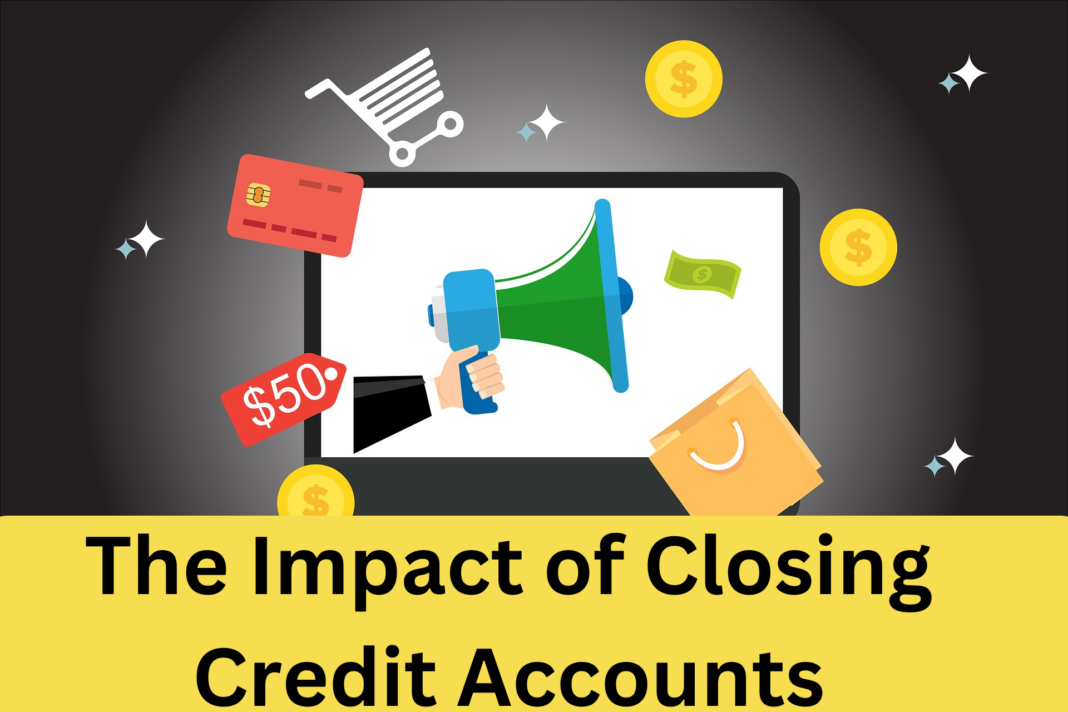Credit cards and other credit accounts are powerful financial tools that help in building credit, earning rewards, and giving one financial flexibility. There could be that time when you would probably consider closing one or more of your credit accounts. Perhaps it is to simplify life, avoid annual fees, or reduce overspending temptations. Closing a credit account might sound easy, but it will have massive repercussions on slashing your credit score, let alone your overall financial health.

This detailed guide will discuss the many ways closing credit accounts can affect one’s credit, both positively and negatively. It will also examine how this affects your credit score, your credit history, and, finally, your financial options. Whether you are considering closing a credit card, a line of credit, or any other type of credit account, this article will arm you with the knowledge you need to make a qualified decision.
Credit Scores and Credit Reports Explained
Before we discuss the impact caused by the closure of credit accounts, it is essential to have a basic background on credit scores and reports.
What is a Credit Score?
A credit score is usually a three-digit number between 300 and 850. The higher the score, the better your credit. In general, lenders use your credit score to determine your creditworthiness- how likely you are to pay back your loans and make your credit card payments on time. The higher your score, the more likely you are to qualify for loans and credit cards with the best terms.
Several factors influence your credit score. While the exact formula remains proprietary, FICO-the most commonly used credit scoring model, published the general breakdown of the components:
- Payment History: Your track record of paying bills on time (35%)
- Credit Utilization: The amount of credit you’re using compared to your credit limits (30%)
- Length of Credit History: How long you’ve had credit accounts (15%).
- Credit Mix (10%): Types of credit you have, from credit cards down to installment loans.
- New Credit (10%): How often do you apply and open new credit accounts?
What is a Credit Report?
A credit report is a detailed history of your credit. It includes data associated with your credit accounts, payment history, hard inquiries, and public records like bankruptcies or tax liens. The three top credit reporting bureaus in the United States include Equifax, Experian, and TransUnion.
The Immediate Consequences of Closing a Credit Account
The moment you close an account in credit, several things immediately take place, including but not limited to the following:
1. The Account is Marked as Closed
They will notify the credit reporting agencies to mark it closed, which will be reflected in your report. Normally they would remain there for 10 years for accounts closed in good standing and 7 years for accounts closed with negative information.
2. You Cannot Use the Account Anymore
Once an account has been closed, it cannot be used again for purchases or transactions. You will want to remember this if you have set up any recurring payments on the account.
3. Your Available Credit Decreases
Your total available credit goes down by the amount of credit limit on the closed account. The consequences of this would result in your credit utilization ratio, which will be elaborated on later.
Long-term Impact on Credit Score
The long-term effects of closure can be more involved and reach a greater extent. Let’s delve into how this affects the different components of credit score:
Credit Utilization Ratio Impact
Your credit utilization ratio is the credit amount used currently divided by your total available credit. For example, if you have $2,000 in credit card balances against a total limit of $10,000 in credit limits, then your utilization ratio is 20%.
Each time you close a credit account, you decrease your total amount of available credit. If you have balances on other cards, this might cause your utilization ratio to increase-something that, in turn, can reduce your credit score. For instance:
Before closing: $2,000 balance / $10,000 total credit = 20% utilization
After closing a card with a $4,000 limit: $2,000 balance / $6,000 total credit = 33% utilization
Generally speaking, you want it below 30%; the lower, the better. If closing one would put you over that threshold, then that might be one to reconsider.
Impact of Credit History Length
The length of credit history makes up about 15% of your FICO score. It considers factors like:
- The age of your oldest account
- The age of your newest account
- The average age of all your accounts
Closing your oldest credit account can potentially shrink your credit history, especially if it is substantially older than the rest of your accounts. But remember, accounts that are closed but in good standing can remain on your credit report for as long as a decade. So the impact might not be immediate.
Impact on Credit Mix
Variety is the spice of life, and a diverse mix of credit types- including credit cards, installment loans, and mortgages- is ideal for your credit score. Closing one account can slightly lower your credit score only if it reduces your credit mix. For example, you may have only one type of installment loan or only one credit card.
While closing a credit account can have negative impacts, there are situations where it might be the right decision:
High Annual Fees
If you’re paying for a high annual fee credit card that you barely use or one that doesn’t provide value equal to the fee, closing the account may save you money in the long run.
Difficulty Managing Multiple Accounts
If holding multiple credit accounts is causing you to either miss payments or overspend, consolidation and the closing of some accounts may make it easier to manage your finances.
Joint Accounts When You Separate or Divorce
If you shared credit accounts with a former spouse, you may want to close those accounts in order to avoid future financial problems.
Suspecting Fraud or Identity Theft
Closing a suspected compromised account prevents fraudsters from further abusing that specific account.
Other Options Aside from Closing Credit Accounts
If you are concerned about the potential adverse effects of closing a credit account, then take into consideration these alternative solutions:
1. Maintain the Account but Do Not Use It
If your only reason for closing the account is to help you resist the temptation to overspend, you can leave the account open but take the card out of your wallet and remove it from any online shopping profiles.
2. Downgrade to a No-Annual-Fee Card
If you are considering canceling a card because you wish to avoid an annual fee, ask the issuer if you can downgrade to a no-fee version.
3. Negotiate Better Terms
Sometimes a credit card company will waive an annual fee or offer other better terms if you’re considering canceling an account. It can’t hurt to ask.
4. Charge a Small, Recurring Payment on the Card
Consider putting the account in service for a small, regular payment as a means of keeping the account active. Make it the equivalent of a subscription to a specific streaming service, and set up automatic payments so that you’ve never been late.
Steps to Take Before Closing a Credit Account
If you have determined that the closure of a credit account is best for you, here are steps to take:
1. Pay Off the Balance
Pay off any remaining balance on the account. If this is a credit card with a high balance, you may want to consider transferring it to a different card with a lower interest rate.
2. Redeem Any Rewards
First, if the account you are canceling is a rewards credit card, redeem any accrued points, miles, or cash back before closing the account.
3. Cancel Any Automatic Payments
If you pay bills using the account in question, be sure to update recurring payments with new details before canceling an account.
4. Notify Authorized Users
If you have any cardholders authorized to use the account, let them know it will be closed.
5. Document the Closure
When you close the account, ask for written confirmation. File this in your records in case problems appear at a later date.
How to Properly Close a Credit Account
Once you’ve made your advance preparations, here’s how you correctly close a credit account:
- Contact the creditor: Call the customer service number on the back of your card or on your statement.
- Confirm that the account balance is zero: Ensure that you have paid any outstanding amount.
- Inform them of the intent to close the account: You should clearly state that you want to close the account.
- Ask about repercussions: You can ask if this will impact your credit score in any manner.
- Get confirmation: Ask for written confirmation that the account has been closed at your request with a $0 balance.
- Follow up: Check your credit report after a few weeks to make sure the account is reported as closed.
Monitoring Your Credit After Closing an Account
When a credit account has been closed, one needs to monitor his or her credit in order to know the implications this action brings about and whether or not the closing of such credit has been appropriately reported:
Pull Your Credit Reports
You can request one free credit report from each of the three major credit bureaus once per year from AnnualCreditReport.com. Look to see that the account was reported as closed.
Monitor Your Credit Score
Most credit card issuers and banks offer free credit score monitoring. Use these to know how, if at all, your score might change after the account is closed.
Look for Errors
If you find any mistakes in reporting the account closure, dispute them with the credit bureaus immediately.
The Psychology of Credit Management
As much as credit management involves numbers and financial strategy, there is also a bit of psychology involved:
Simplification and Peace of Mind
Having fewer credit accounts to manage can be less stressful for some and simplify their financial lives. This peace of mind may be worth a small ding in their credit score.
Avoiding Temptation
If you have trouble with overspending, closing a credit account may be a good way of avoiding the temptation to make impulse buys.
Financial Identity and Self-Control
Managing your credit is sometimes closely entwined with your sense of financial identity and self-control. A decision to close an account- even one with some negative impacts- can be quite empowering if the decision better aligns with your financial goals and values.
Special Considerations for Different Types of Credit Accounts
While we have generally focused on credit cards, the impact of closing an account depends upon the type of credit account. For instance,
Installment Loans
However, paying off and closing an installment loan, such as an auto loan or personal loan, doesn’t have quite the same impact on your credit score as closing a revolving credit account, such as a credit card. This might even have a positive effect in some cases because it reflects that you paid off a loan.
Home Equity Lines of Credit HELOCs
Closing a HELOC somewhat resembles closing a credit card in that the available credit decreases. If one is already in the repayment period of the HELOC, early closure will hurt one’s credit if the balance has not been paid off.
Business Credit Cards
Closing a business credit card will influence your business and personal credit; the effect actually depends on how the card issuer reports to the credit bureaus. Be sure to understand these implications before closing a business credit account.
Conclusion
Closing a credit account is not a decision to be taken lightly. Though it may sometimes be the right choice for your financial situation, it’s very important to understand the possible consequences for your credit score and overall financial health.
In this regard, a decrease in your credit utilization ratio, a reduction in the length of credit history, and changes in credit mix are the possible impacts of closing a credit account. These changes may reduce your credit score, at least in the short run. Note that the impact does vary depending on one’s overall credit profile and which account one is closing.
First, consider alternatives to closing your account, including keeping it open but inactive or downgrading to a no-fee card version. If you determine that closing an account is best, pay the balance, redeem the rewards, and get written confirmation that the account has been closed.
Remember that your credit score is just one part of your broader financial health. Sometimes, peace of mind from simplifying finances or avoiding annual fees outweighs any temporary dip in credit score.
The critical moments in credit account management are to stay informed, make decisions based on your goals about personal finance, and regularly monitor your credit reports and scores. Knowing the repercussions of your financial decisions, such as closing credit accounts, will put you in the driver’s seat to take control of your credit toward a much healthier financial future.






